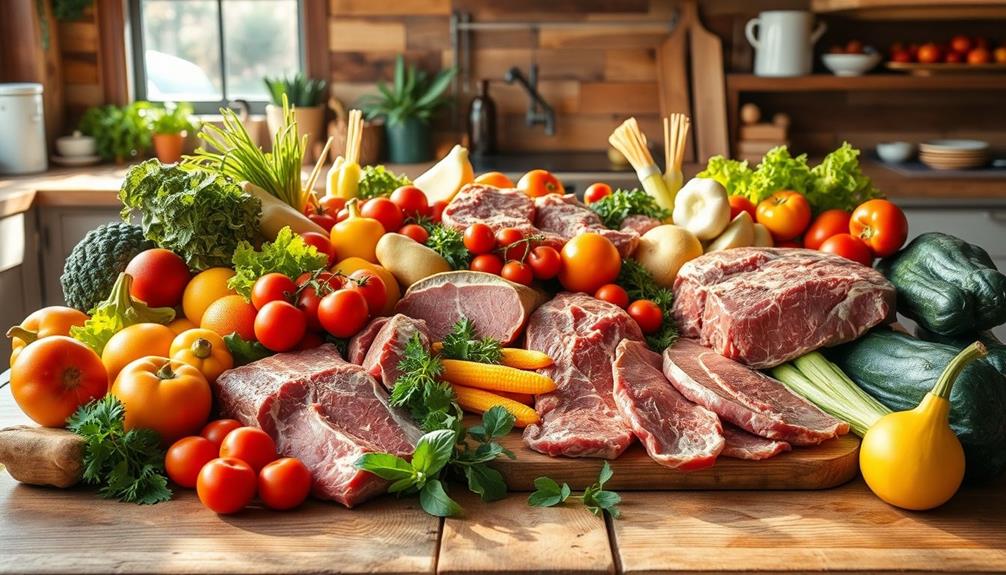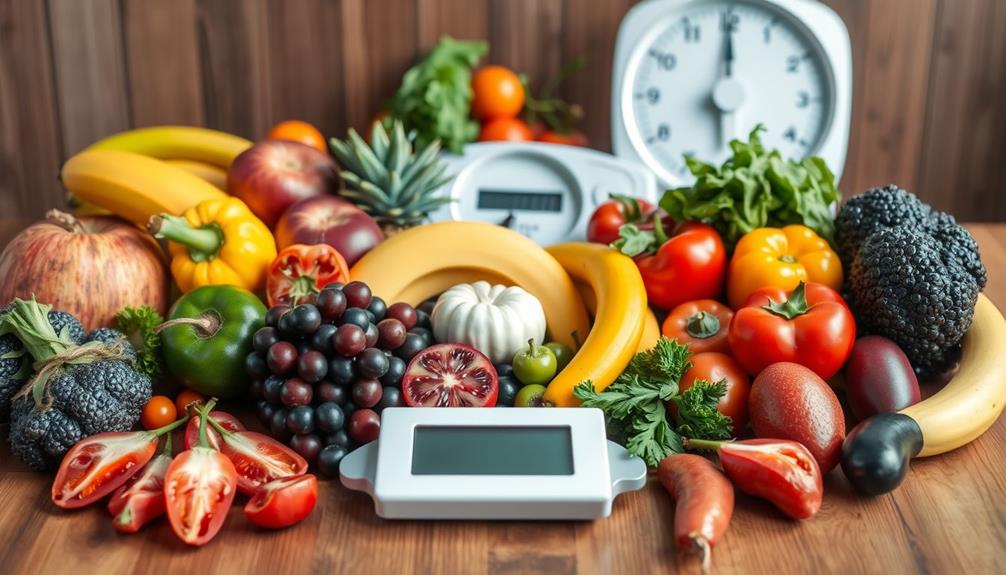Yes, raw food can be risky for you during pregnancy. Consuming raw or undercooked foods may expose you to harmful bacteria like Listeria, Salmonella, and Toxoplasma. These infections can lead to severe complications for both you and your baby. Raw seafood, eggs, unpasteurized dairy, and unwashed produce greatly heighten these risks. Additionally, high-mercury fish should be avoided to protect fetal development. It's essential to prioritize food safety by thoroughly cooking animal products and avoiding certain foods. Stay informed about dietary choices to guarantee a healthy pregnancy, and there's a lot more to discover on this topic.
Key Takeaways
- Consuming raw or undercooked foods increases the risk of severe infections like Listeriosis, which can lead to miscarriage in pregnant women.
- Raw seafood, including sushi, can expose pregnant women to harmful bacteria and parasites, posing risks to fetal health.
- Unpasteurized dairy products, such as soft cheeses, can transmit Listeria, significantly increasing risks during pregnancy.
- Unwashed fruits and vegetables may harbor pathogens; thorough washing is essential to reduce infection risks.
- High-mercury fish should be avoided during pregnancy due to potential developmental harm to the fetus.
Risks of Raw Food
When it comes to nutrition during pregnancy, the risks of raw food can't be ignored. Consuming raw seafood, like sushi and shellfish, exposes you to harmful bacteria and parasites that can lead to serious foodborne illnesses. These infections, such as Listeriosis, Toxoplasmosis, and Salmonellosis, can have devastating effects on both you and your unborn child.
Additionally, pregnant women are generally advised to be proactive in their health screenings, as early detection of any issues can greatly improve outcomes, similar to the importance of mammography guidelines in breast cancer prevention.
Raw or undercooked eggs pose another risk, as they may contain Salmonella, which can cause symptoms like fever and diarrhea. Unpasteurized dairy products are particularly concerning, as they can transmit Listeria, linked to severe complications such as miscarriage and stillbirth.
Even raw fruits and vegetables can harbor pathogens like E. coli and Salmonella if not washed properly. Raw sprouts are especially vulnerable to contamination, making it essential to verify that everything you consume is thoroughly cleaned or cooked.
Safe Cooking Temperatures

When it comes to cooking for you and your baby, knowing safe cooking temperatures is essential. Each type of food has specific internal temperature guidelines to kill harmful bacteria and guarantee safety.
For instance, guaranteeing proper airflow around your kitchen appliances can enhance cooking performance, similar to how you'd maintain an air purifier's efficiency.
Using a food thermometer is your best bet for making certain everything's cooked just right.
Importance of Cooking Temperatures
Cooking temperatures play an important role in guaranteeing food safety, especially for pregnant women. When you're cooking, it's essential to reach specific temperatures to eliminate harmful bacteria.
For instance, whole cuts of meat should hit at least 145°F (63°C), while ground meats need to reach 160°F (71°C). Poultry is even more important; it must be cooked to 165°F (74°C) to guarantee safety.
Understanding the importance of a budget for managing food expenses can also help you invest wisely in quality ingredients.
Seafood, including raw fish, should also be cooked to an internal temperature of 145°F (63°C) to kill off pathogens that could pose risks.
Eggs aren't exempt either; they must be cooked until both the yolks and whites are firm, hitting a minimum of 160°F (71°C) to avoid Salmonella contamination.
Using a food thermometer is necessary for accurately measuring these internal cooking temperatures.
Additionally, when reheating processed meats like hot dogs and deli meats, make sure they're steaming hot to further reduce the risk of Listeria contamination.
Safe Internal Temperature Guidelines
Understanding safe internal temperature guidelines is key to protecting both your health and that of your unborn baby. As a pregnant woman, you need to be particularly vigilant about food safety. The USDA recommends cooking whole cuts of meat to a minimum internal temperature of 145°F (63°C). Ground meats should reach at least 160°F (71°C), while poultry, like chicken and turkey, needs to be cooked to a safe internal temperature of 165°F (74°C) to eliminate harmful bacteria.
Additionally, cold medications overview can provide insights into managing any cold symptoms while pregnant, guaranteeing both comfort and safety.
Seafood is another area where you need to be cautious—cook it to 145°F (63°C) to confirm it's safe for consumption. Eggs should be cooked until both the yolks and whites are firm, reaching a safe internal temperature of 160°F (71°C) to prevent Salmonella infection.
When it comes to leftovers, make sure to reheat them to at least 165°F (74°C) to effectively eliminate any potential pathogens.
Avoiding raw food during pregnancy can help you adhere to these safe internal temperature guidelines, safeguarding your health and that of your child. Always prioritize cooking your meals thoroughly to guarantee maximum safety.
High Mercury Fish
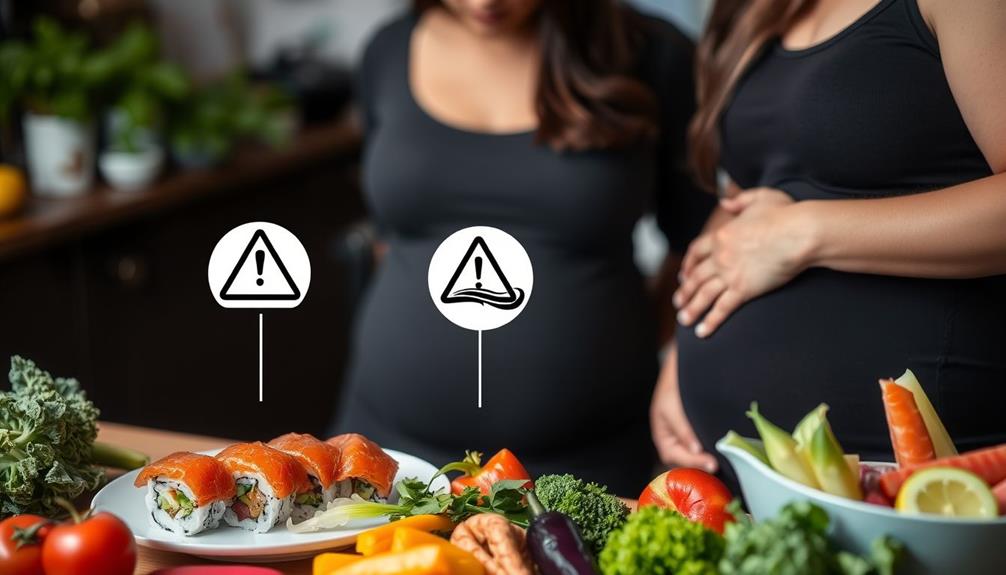
Pregnant women must be vigilant about their dietary choices, especially regarding high-mercury fish, which can pose serious risks to fetal development.
Ice cream, while not a fish, is another food that requires caution due to potential health implications, especially if consumed in excess. Mercury exposure can lead to developmental issues, particularly affecting the nervous and immune systems of your baby.
It's essential to eliminate fish known for high mercury levels from your diet, including shark, swordfish, king mackerel, bigeye tuna, and marlin. Additionally, steer clear of tilefish from the Gulf of Mexico and orange roughy, as they also contain elevated mercury levels.
The FDA recommends limiting your consumption of low-mercury seafood to 8-12 ounces (224-336 grams) per week during pregnancy for peak fetal health. Lactose-free options are available for those concerned about dairy intake.
Fortunately, there are plenty of fish that are safe to eat while pregnant. Options like salmon, catfish, and shrimp are lower in mercury and provide essential nutrients that support your baby's growth and development.
Raw Animal Products
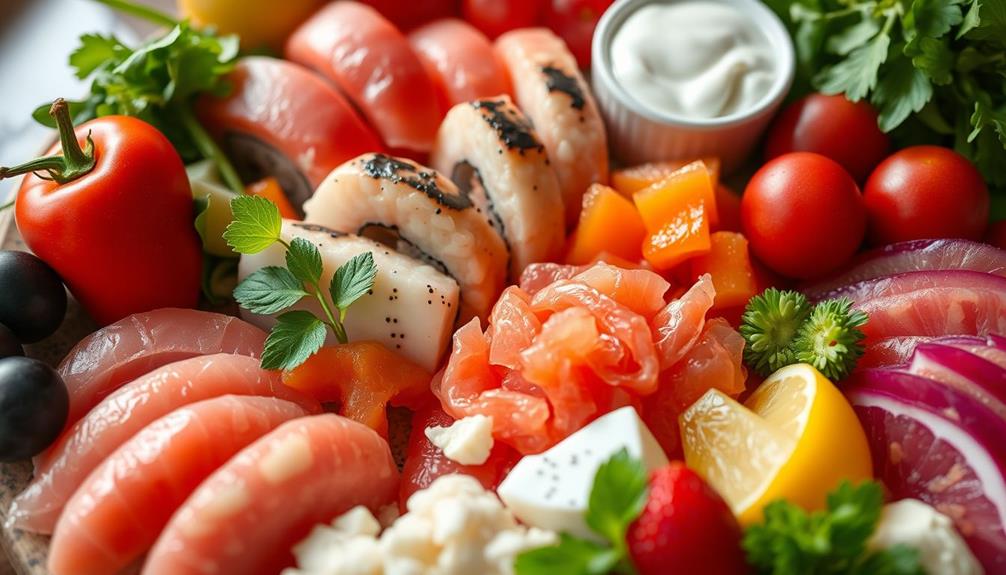
When you're pregnant, it's essential to be aware of the infection risks associated with raw animal products. Eating raw fish, undercooked meat, or raw eggs can expose you and your baby to harmful bacteria and parasites.
Additionally, consuming foods with high levels of oxalates, such as raw beets, may lead to digestive issues that are best avoided during pregnancy nutritional benefits.
To stay safe, focus on cooking these foods to the recommended temperatures and consider healthier alternatives that protect your health.
Infection Risks Overview
Raw animal products pose significant infection risks that can seriously impact both maternal and fetal health. When you consume these foods, you increase your chances of encountering harmful bacteria and parasites, which can lead to severe complications during pregnancy.
Individuals with certain mental health disorders, such as Borderline Personality Disorder, may also experience heightened emotional responses to foodborne illnesses, making these risks even more concerning.
It's vital to be aware of the specific dangers:
- Salmonella: Found in raw or undercooked eggs, this bacterium can trigger foodborne illness symptoms like fever, nausea, and diarrhea, complicating your pregnancy.
- Listeria: Pregnant women have a 10-fold increased risk of listeria infection, which can result in miscarriage, stillbirth, or preterm delivery.
- Vibrio: This pathogen, often present in raw or undercooked seafood, particularly shellfish, can cause gastroenteritis and poses serious risks for pregnant women.
Given these infection risks associated with raw animal products, it's important to avoid them entirely during pregnancy.
Protecting your health and that of your developing baby should be your top priority. Always opt for thoroughly cooked foods to minimize the threat of foodborne illness and guarantee a safer pregnancy journey.
Safe Cooking Temperatures
Understanding safe cooking temperatures for animal products is essential for ensuring your health during pregnancy. Undercooked meat can harbor harmful bacteria that pose risks to both you and your baby. To minimize these risks, it's vital to cook various animal products to their appropriate internal temperatures.
Here's a quick reference table for safe cooking temperatures:
| Animal Product | Safe Cooking Temperature |
|---|---|
| Whole cuts of meat | 145°F (63°C) + 3 min rest |
| Ground meats | 160°F (71°C) |
| Poultry | 165°F (74°C) |
| Eggs | 160°F (71°C) |
| Seafood | 145°F (63°C) |
Recommended Alternatives During Pregnancy
Avoiding raw animal products during pregnancy is vital for your health and your baby's development. Consuming raw fish and seafood can expose you to harmful bacteria and parasites, increasing the risk of severe health complications.
Additionally, maintaining oral health during pregnancy is important, and using essential oils like clove oil for toothache relief can be beneficial.
Instead, consider these recommended alternatives that are safe during pregnancy:
- Cooked Seafood: Choose options like canned tuna or well-cooked shrimp. These alternatives provide essential nutrients without the risks associated with raw fish.
- Reheated Deli Meats: If you're craving deli meats or hot dogs, make sure to reheat them until steaming hot. This eliminates the risk of Listeria and keeps you and your baby safe.
- Pasteurized Eggs: When using eggs in recipes, opt for pasteurized eggs. They greatly reduce the risk of Salmonella, allowing you to enjoy dishes like quiches or homemade mayonnaise without worry.
Processed and Deli Meats

Processed and deli meats can pose serious health risks for pregnant women, primarily due to the potential presence of harmful bacteria like Listeria. This bacterium can lead to severe complications, including miscarriage and stillbirth. Since many processed meats are uncooked or stored at unsafe temperatures, there's an increased risk of bacterial contamination during processing and storage.
Additionally, understanding the importance of nutritional choices during pregnancy is vital for both maternal and fetal health, as highlighted in discussions about financial considerations for elderly care.
For your health and safety, it's essential to take precautions when consuming processed meats. Always reheat these products until they're steaming hot to eliminate any lurking bacteria.
However, keep in mind that processed meats often contain high levels of sodium and unhealthy fats, which can contribute to excessive weight gain and other complications during your pregnancy.
To safeguard your health and that of your baby, it's best to avoid deli meats unless you can verify they're thoroughly heated. Instead, opt for fresh, cooked meats that provide essential nutrients without the associated risks.
Unwashed Fruits and Vegetables
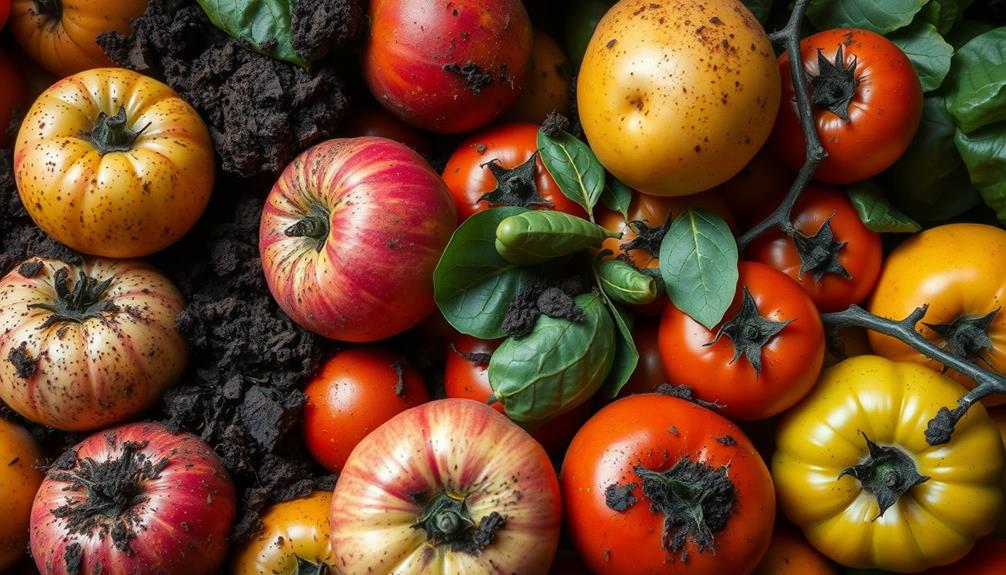
Unwashed fruits and vegetables can pose significant health risks for pregnant women and their unborn babies.
These unwashed fruits may harbor harmful bacteria and pathogens like Toxoplasma, E. coli, Salmonella, and Listeria. These contaminants can lead to serious foodborne illnesses that could affect both you and your baby.
Additionally, it's important to guarantee that the foods you consume are safe, much like how proper hamster care involves monitoring diet and cleanliness to prevent health issues.
To minimize these risks, here are three essential practices:
- Thorough Washing: Always wash your fruits and vegetables under running water for at least 20 seconds. This helps remove dirt and reduces bacterial contamination.
- Peeling: When possible, peel fruits and vegetables to further decrease exposure to bacteria.
- Cooking: Cooking can kill harmful pathogens, so consider cooking certain vegetables to guarantee they're safe to eat.
Raw Dairy Products

Raw dairy products can be a hidden danger for pregnant women, as they often contain harmful bacteria that threaten both your health and your baby's. Consuming unpasteurized milk and soft cheeses like queso fresco, brie, and feta can expose you to bacteria such as Listeria, Salmonella, and E. coli.
Listeria infection is particularly concerning during pregnancy; you have a tenfold increased risk, which can lead to severe complications, including miscarriage, stillbirth, or serious illness in your newborn.
The Centers for Disease Control and Prevention (CDC) and the Food and Drug Administration (FDA) strongly recommend that pregnant women only consume pasteurized dairy products. This precaution is crucial in minimizing the risk of listeriosis and other foodborne illnesses.
Always check labels to verify your dairy choices are pasteurized.
Avoiding raw dairy products during your pregnancy not only protects your health but also safeguards your baby's well-being.
Impact on Pregnancy Outcomes

When you're pregnant, consuming raw or undercooked animal products can put you at risk for serious infections that may lead to miscarriage or stillbirth.
These infections not only threaten immediate pregnancy outcomes but can also cause long-term developmental delays in your baby.
It's essential to understand how these risks can impact both your health and your child's future.
Infection Risks During Pregnancy
Infection risks during pregnancy can have profound impacts on both maternal and fetal health. Consuming raw or undercooked foods greatly increases the chances of infections in pregnant women. These foodborne illnesses can lead to severe complications, making it vital to understand the risks involved.
Here are three key points to take into account:
- Listeriosis: Pregnant women are ten times more susceptible to Listeria infection, which can result in miscarriage, stillbirth, or severe illness in newborns.
- Toxoplasmosis: Acquired from undercooked meats, this infection poses a 10-15% chance of transmission to the fetus if contracted during the first trimester, potentially causing vision loss and developmental issues.
- Salmonellosis: This infection can lead to preterm labor and low birth weight, further complicating pregnancy outcomes.
Since you're at high risk for serious health impacts, it's essential to avoid raw foods.
Remember, foodborne illnesses mightn't always show symptoms in you, but they can have devastating effects on your unborn child.
Prioritizing safety can help guarantee a healthier pregnancy for both you and your baby.
Developmental Delays From Contamination
Pregnancy is a delicate time, and the risks associated with consuming contaminated foods can greatly jeopardize your baby's development. Consuming raw or undercooked foods increases the chance of infections from harmful pathogens like Listeria, Salmonella, and Toxoplasmosis. These infections can lead to miscarriage or developmental delays in your unborn child.
Contaminated seafood, for instance, may expose your baby to high mercury levels, which are linked to cognitive impairments and behavioral issues. It's essential to understand that maternal infections can severely disrupt fetal development. Congenital toxoplasmosis, contracted in the first trimester, may result in vision loss and developmental delays.
Here's a summary of the potential risks:
| Pathogen | Risk | Impact on Development |
|---|---|---|
| Listeria | Severe complications, stillbirth | Increased risk of congenital defects |
| Salmonella | Gastrointestinal illness | Potential for developmental delays |
| Toxoplasmosis | Vision loss | Cognitive impairments, delays |
| Mercury (seafood) | Cognitive impairments | Behavioral issues in children |
Avoiding raw foods during pregnancy can help mitigate these risks and promote healthier outcomes for your baby.
Long-term Health Effects
Consuming raw or undercooked foods during pregnancy often leads to serious long-term health effects for both you and your baby. The risks of foodborne illnesses, such as Listeriosis and Toxoplasmosis, can greatly impact pregnancy outcomes.
These infections not only heighten the chance of miscarriage but can also result in lasting health complications for your newborn.
Consider the following long-term health effects:
- Increased Risk of Congenital Defects: A Toxoplasmosis infection during the first trimester can lead to congenital defects, affecting your baby's development and health.
- Developmental Delays: Exposure to pathogens like Salmonella or E. coli may raise the risk of developmental delays, impacting your child's cognitive and physical growth.
- Complications in Future Pregnancies: Experiencing severe foodborne illnesses can lead to complications in future pregnancies, making it vital to prioritize safe food handling.
Understanding the potential long-term health effects emphasizes why it's important to avoid raw foods during pregnancy.
Protecting yourself from these risks guarantees a healthier outcome for both you and your baby.
Long-term Effects on Children

When mothers eat raw or undercooked foods, they may unknowingly expose their unborn children to serious health risks. Infections like Listeriosis and Toxoplasmosis can arise, leading to considerable long-term effects on health and development.
For instance, infants born to mothers who contract congenital toxoplasmosis have a 10-15% chance of transmission, which could result in serious developmental challenges, such as vision loss and learning disabilities.
Moreover, listeriosis can cause severe complications in newborns, including meningitis and long-term neurological issues. It's clear that prenatal exposure to pathogens from contaminated food can lead to developmental delays and cognitive impairments in affected children.
While monitoring and early intervention can help alleviate some of these long-term effects, the importance of food safety during pregnancy can't be overstated.
Adopting safe dietary practices is essential for protecting not just your own health, but also the well-being of your child. By being cautious about what you consume, you can considerably reduce the risk of congenital infections and safeguard your child's future development.
Prioritize food safety to guarantee a healthier outcome for your little one.
Food Safety Recommendations

Ensuring food safety is essential for pregnant women to protect both their health and their baby's development. When it comes to what you eat, being informed is key. Here are some essential recommendations to follow:
- Cook raw meats thoroughly: Make sure to cook all raw meats and poultry to safe minimum internal temperatures—145°F for whole cuts, 160°F for ground meats, and 165°F for poultry. This helps eliminate harmful pathogens like E. coli and Salmonella.
- Avoid unpasteurized dairy products: Stay away from unpasteurized dairy, especially certain soft cheeses, as they can harbor Listeria. Consuming these can lead to severe complications for both you and your baby.
- Wash fruits and vegetables: Always wash fruits and vegetables thoroughly to remove any potential contaminants such as Toxoplasma, E. coli, and Salmonella. This is crucial for maintaining food safety during your pregnancy.
Frequently Asked Questions
Why Shouldn't Pregnant Women Eat Raw Food?
You shouldn't eat raw food during pregnancy because it increases your risk of harmful bacteria and parasites. These can lead to severe health issues for you and your unborn child, compromising both your health and safety.
What Happens if You Accidentally Eat Raw Meat While Pregnant?
Imagine the worry you'll feel if you accidentally eat raw meat while pregnant. Contact your healthcare provider immediately to assess any risks, monitor symptoms, and guarantee both you and your baby stay safe throughout your pregnancy.
What Foods Should Pregnant Women Avoid?
You should avoid high-mercury fish, raw seafood, unpasteurized dairy, raw eggs, and unwashed fruits and vegetables. These can expose you to harmful bacteria, viruses, or toxins that could seriously affect your pregnancy and your baby's health.
Can Pregnant Women Touch Raw Meat?
Yes, you can touch raw meat while pregnant, but you must wash your hands thoroughly afterward. Always use separate cutting boards and utensils to avoid cross-contamination and guarantee all surfaces are sanitized to stay safe.
Conclusion
In the delicate dance of pregnancy, every bite matters. While the allure of raw food may tempt you, it's essential to navigate these waters carefully. The risks lurking in raw animal products and high-mercury fish could cast shadows on your baby's bright future. By prioritizing safe cooking practices and steering clear of unsafe options, you're not just nourishing your body; you're cradling the hopes and dreams of your little one, ensuring they flourish in a safe, loving environment.




